THE ENGLISH SONG COLLECTION
Featured Works
Click on the cover images for details of each disc
THE ENGLISH SONG COLLECTION
Featured Works
Click on the cover images for details of each disc

William ALWYN (1905–1985)
Mirages · Nocturnes · Slum Song · Seascapes · Invocations
DISC 18
William Alwyn composed prolifically in virtually all genres – orchestral, chamber, vocal and instrumental. His major works for the voice were composed during the latter part of his career, between 1965 and 1980, and include four of the song cycles recorded here. These are settings of poems by the composer himself, the Irish poet Louis MacNeice, and the composer’s good friend, Michael Armstrong, who lived for over 40 years in Jersey where he derived much inspiration from the sea and the surrounding landscape. Seven of the songs here receive their world premiere recording.
‘Superb music making and artistry in this excellent release… Alwyn’s striking individuality as a songwriter emerges in sharp relief here.’ – Classic FM
‘Jeremy Huw Williams brings conspicuous ardour and intelligence to the task in hand… It almost goes without saying that lain Burnside proffers immaculate support.’ – Gramophone
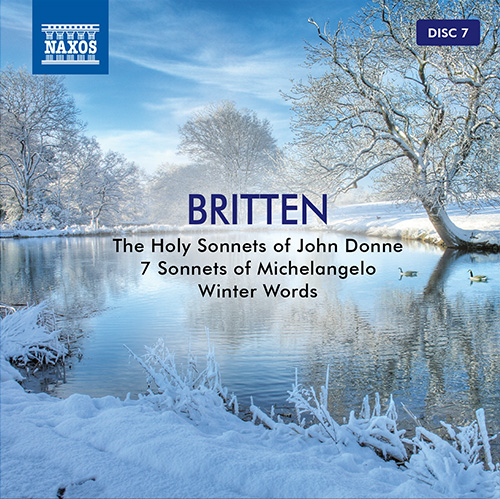
Benjamin BRITTEN (1913–1976)
The Holy Sonnets of John Donne · 7 Sonnets of Michelangelo · Winter Words
DISC 7
Britten’s song cycles form a substantial and important part of his work. The 7 Sonnets of Michelangelo belong to the period when Britten had begun to set foreign languages in an attempt to broaden his musical horizons. It is his first work composed exclusively for Peter Pears and deals with various aspects of love. Written in August 1945, soon after Britten had returned from a tour of German concentration camps with Yehudi Menuhin, The Holy Sonnets of John Donne captures some of the bleak intensity of that experience. In the eight settings of Thomas Hardy, Winter Words, written in 1953, there is no less abundance of the musical invention and imagery found in the earlier cycles, but the textures are generally leaner and more economical.
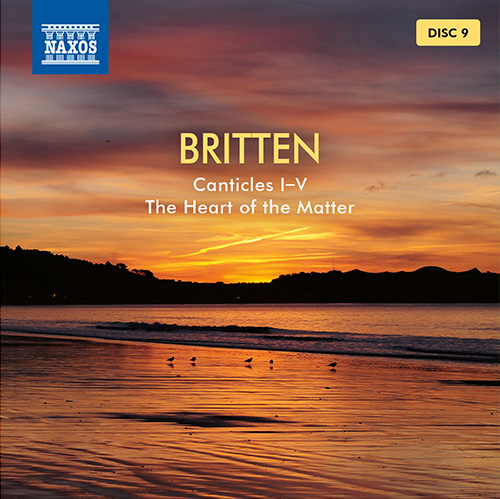
Benjamin BRITTEN (1913–1976)
Canticles I–V · The Heart of the Matter
DISC 9
Britten’s five Canticles are marvellously vivid, intensely dramatic works. Although they were not designed to be performed together – they span virtually his whole career, from the early 1940s to the mid-1970s, and were composed for a variety of forces and singers – they form a remarkably effective sequence. Each is in some way inspired by religion and takes the form of an extended song, scena, miniature cantata or even, in the case of Abraham and Isaac, virtually a mini opera. All five were composed for the tenor voice of Peter Pears, and chart the personal and creative relationship between Britten and his most important muse.
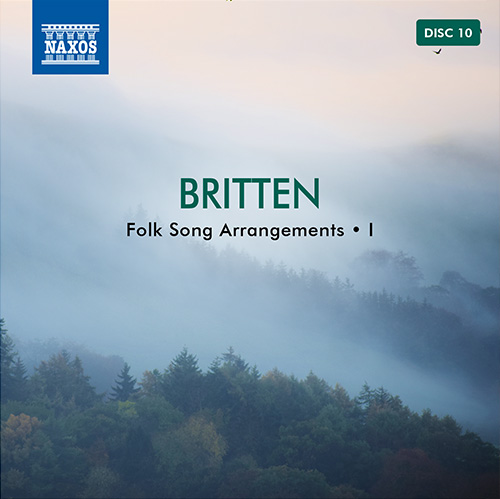
Benjamin BRITTEN (1913–1976)
Folk Song Arrangements, Vol. 1
DISC 10
Benjamin Britten was throughout his life drawn to folk song, possessing a special gift for word setting and vocal writing. This release (along with Discs 11 and 14), previously available on Collins Classics, present all the known folk songs, in both their piano and orchestral arrangements, along with the volumes for guitar and harp. Discs 10 and 11 include ten world premiere recordings of folk song arrangements published as recently as 2001.
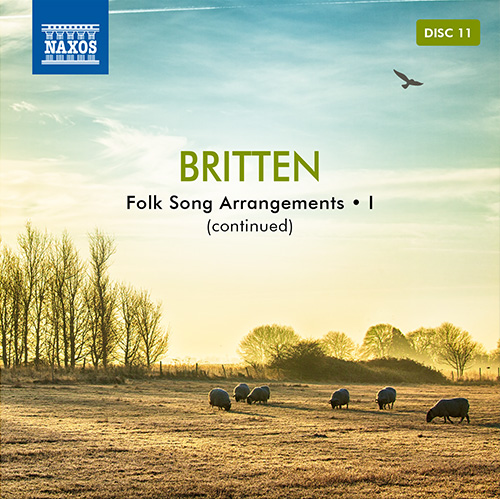
Benjamin BRITTEN (1913–1976)
Folk Song Arrangements, Vol. 1 (continued)
DISC 11
Benjamin Britten occupies an unrivalled position in English music of the 20th century and a place of the greatest importance in the wider musical world. His second volume of arrangements, dedicated to tunes from France, was published in 1946 and dedicated to Britten’s young friends Arnold and Humphrey Gyde, the latter his godson, the children of the singer Sophie Wyss. It was not until 1960 that a fourth volume of folk song arrangements appeared, this time devoted to a group of Moore’s Irish Melodies. The sixth volume, published in 1961, is for high voice and guitar – songs performed by Peter Pears and the guitarist Julian Bream.

Benjamin BRITTEN (1913–1976)
Folk Song Arrangements, Vol. 2
DISC 14
Benjamin Britten was throughout his life drawn to folk song, possessing a special gift for word setting and vocal writing. This second album of the complete folk song arrangements focuses on the orchestral versions and the volumes for guitar and harp.
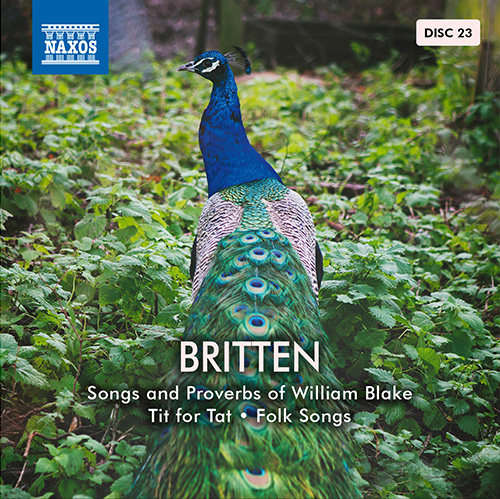
Benjamin BRITTEN (1913–1976)
Songs and Proverbs of William Blake · Tit for Tat · Folk Songs
DISC 23
Britten wrote his Songs and Proverbs of William Blake, Op. 74 for the German baritone Dietrich Fischer-Dieskau in 1965. The singer admired the ‘concentration and enigmatic smile’ of the settings, and Britten constructed, through alternation of proverbs with songs, and an intense contemplation on the human and the eternal, one of his greatest song cycles. By contrast, Tit for Tat sees Britten revisiting youthful, light-spirited settings of the poet Walter de la Mare. The folk song arrangements are amongst his most famous, and beloved.

Benjamin BRITTEN (1913–1976)
Complete Scottish Songs · A Birthday Hansel · Who Are These Children?
DISC 25
Steeped in an atmosphere of ancient Scottish musical tradition, Benjamin Britten’s setting of texts by Robert Burns in A Birthday Hansel was his final song cycle. Who are these children? is another late cycle to poems by William Soutar, combining darkly dramatic musical depictions of wartime life with protest songs which hark back to the composer’s youth. Acclaimed Scottish tenor Mark Wilde’s sensitivities embrace both the vibrantly dramatic and ‘gently mellifluous’ (Manchester Evening News) qualities in this deeply expressive repertoire.
‘Philip Langridge gives intense and dramatic performances of the three most important Britten song-cycles with piano.’ – The Penguin Guide ★★★ on Sonnets
‘For the complete folk-song arrangements, this is the only game in town... the clear notes and texts, fine sound, good singing, and masterful accompanying.’ – Fanfare on Folk-Song Arrangements
‘Williams finds an ideal emotional stance – involved, totally word-conscious but never melodramatic… [he] and Burnside have created an outstanding achievement.’ – Gramophone Choice on Blake Songs and Poverbs
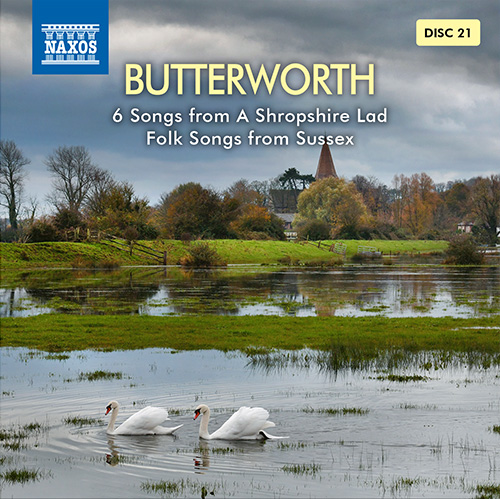
George BUTTERWORTH (1885–1916)
6 Songs from A Shropshire Lad · Folk Songs from Sussex
DISC 21
One of England’s most distinctive composers, George Butterworth belonged to the generation of young men decimated in the Great War of 1914–18. His sensitive and melancholic settings of poems from A.E. Housman’s A Shropshire Lad, with their subject matter of the futility and arbitrariness of war, are small-scale masterpieces. Of particular note are the Loveliest of trees, describing the passing of the seasons, and the ghostly and elegiac Is my team ploughing? The Folk Songs from Sussex and settings of poems by R.L. Stevenson, Shelley and Wilde, whose subject matter revolves around flirtation, love, courtship, marriage and desertion, are no less notable for their attention to detail, linguistic nuance and delicate, economical piano writing.
‘Williams’ engagingly fresh delivery, secure technique, eloquent turn of phrase and variety of tone are a joy throughout, as is his crystal-clear diction. Burnside, too, is at his customarily unmannered, attentive best, the crispness and poise of his pianism a pleasure to encounter.’ – Gramophone Recommends
‘Another collection from Roderick Williams, rapidly becoming the voice of this repertoire – and not without reason.’ – BBC Music Magazine
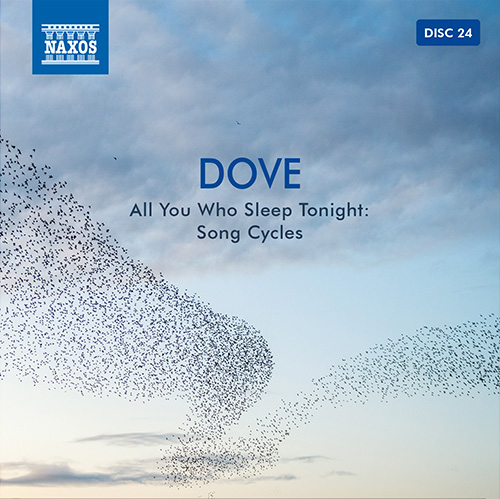
Jonathan DOVE (b. 1959)
All You Who Sleep Tonight: Song Cycles
DISC 24
Jonathan Dove is one of Britain’s most resourceful and versatile contemporary composers, whose affinity for vocal setting is especially striking. From the operatic canvas of his acclaimed Flight to his song cycles, his acutely perceptive approach to texts is unmistakeable. Out of Winter, written in collaboration with Dove, is the late Sir Robert Tear’s poetic response to Thomas Hardy’s Winter Words. Cut My Shadow is a powerful and harrowing setting of three Lorca texts notable for a sense of constant unease and longing for a homeland. All You Who Sleep Tonight, to poems by Vikram Seth, is elegant, moving, and witty while Ariel explores Shakespeare’s elusive character from The Tempest in a role for unaccompanied soprano.
‘Imaginative settings of probing texts and engaging performances of works that place challenging demands on the performers make this an exceptional program. All three singers are very good, particularly Spence, but the star of show is Matthews-Owen.’ – American Record Guide
‘In the unaccompanied Ariel, soprano Claire Booth [gave] a virtuoso performance, sung with sensuous beauty.’ – Gramophone Choice
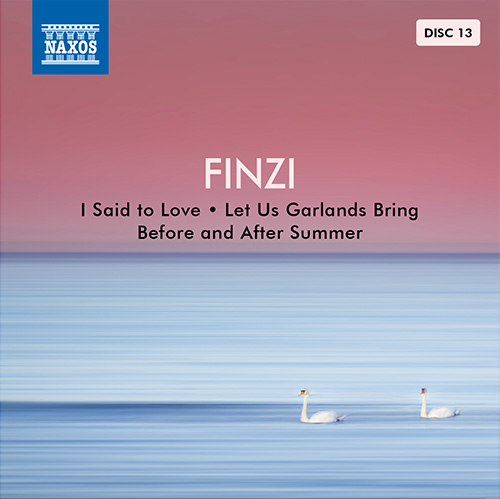
Gerald FINZI (1901–1956)
I Said to Love · Let Us Garlands Bring · Before and After Summer
DISC 13
Gerald Finzi made a significant contribution to British 20th-century song writing, especially with his settings of Thomas Hardy, his favourite poet, whom he set more than any other. Finzi’s empathy with Hardy’s bleak fatalism, his sense of transience and his anger at the suffering that mankind afflicts on fellow human beings permeates all three collections on this album. Highlights include the dramatic I Said to Love, as the poet squares up to his adversary and forecasts that ‘Mankind shall cease’, the haunting Fear no more the heat o’ the sun with its images of the dust to which ‘the golden lads and girls’ must all come, and the large-scale Channel Firing, arguably Finzi’s most ambitious Hardy setting.
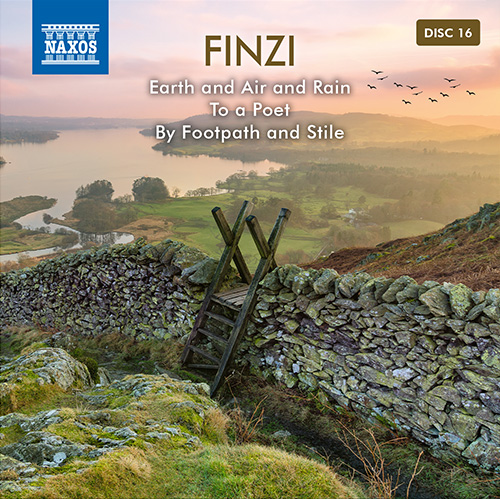
Gerald FINZI (1901–1956)
Earth and Air and Rain · To a Poet · By Footpath and Stile
DISC 16
This second volume of Finzi songs includes two Hardy collections, the early By Footpath and Stile, for baritone and string quartet, and the mature setting Earth and Air and Rain, both of which share the poet’s preoccupation with death and the transience of life. Composed from 1928 to 1932, Earth and Air and Rain includes two of Finzi’s best-known songs, Rollicum-Rorum and To Lizbie Brown, a touching poem of regret for what might have been.

Gerald FINZI (1901–1956)
A Young Man’s Exhortation · Till Earth Outwears · Oh Fair to See
DISC 17
This third and final volume of Finzi songs includes two Hardy settings, A Young Man’s Exhortation and Till Earth Outwears, which share the poet’s preoccupation with the ‘passing preciousness of dreams’, the transience of life and death itself. The posthumously published Oh Fair to See draws on various authors, from Christina Rossetti to Edmund Blunden and Robert Bridges.
‘Williams sounds terrific in this music. His singing is thoughtfully nuanced, with a voice that is clean and clear, at once strong and gentle.’ – American Record Guide on Earth and Air and Rain
‘The careful balance of refined taste and unbridled emotion suits John Mark Ainsley, an artist on terrific form throughout this hugely enjoyable recital.’ – Classic FM ★★★★★ on A Young Man’s Exhortation
‘Tenor John Mark Ainsley and pianist Iain Burnside, both very experienced song recitalists in their respective fields, bring out the relationship between text and music with great clarity.’ – Limelight ★★★★★ on A Young Man’s Exhortation

Ivor GURNEY (1890–1937)
All Night Under the Moon · By a Bierside · On the Downs · Lights Out · 5 Elizabethan Songs
DISC 20
Described by his teacher Stanford as ‘the one who most fulfilled the accepted ideas of genius’, the poet and composer Ivor Gurney composed more than 300 songs despite suffering from bipolar disorder and tuberculosis. The 5 Elizabethan Songs show the young composer’s astonishing limpid fluency, while Tears and Sleep rank among his most exquisite creations. Comedy, desolation and lovelorn longing all touch the music of this ‘lover and maker of beauty’, whose songs find ideal interpreters in Susan Bickley and Iain Burnside.
‘Susan Bickley and Iain Burnside have put together a well-balanced recital of the inward-looking, the tender and the effervescent… This is subtly and winningly executed by both artists.’ – International Record Review
‘A first-rate introduction to the composer, sensitively performed by Susan Bickley and pianist Iain Burnside, one of the country’s leading Gurney experts.’ – BBC Music Magazine

Gustav HOLST (1874–1934)
Vedic Hymns · 4 Songs for Voice and Violin · 12 Humbert Wolfe Settings
DISC 6
Originally released by Collins Classics as part of The English Songs Series, this recording offers a fascinating selection of the 72 solo songs Holst wrote across his entire compositional career. They range from the 6 Songs from 1903–04, representative of the composer’s earlier styles, through to the Vedic Hymns of 1907–08, Holst’s first confident use of ancient Hindu literature, the 4 Songs for voice and violin, inspired by medieval lyrics and folk music modes, to the 12 Humbert Wolfe settings of 1929, songs of ‘love, reflection and fantasy’. The album concludes with The Heart Worships, one of Holst’s best-loved songs.
‘An absorbing selection from the 72 solo songs Holst composed across his career. Of the performers, none is finer than Susan Gritton in the touching songs for voice and violin, where she’s ably partnered by Luisa Fuller.’ – Gramophone
‘Apart from the comparatively well-known, very Holstian and mystically atmospheric Hymns from the Rig Veda, sung sensitively by Christopher Maltman, the most striking songs are the Humbert Wolfe settings, in which Philip Langridge is in his element. Throughout, Steuart Bedford is thoroughly at home in the piano accompaniments, and the recording is excellent.’ – The Penguin Guide ★★★
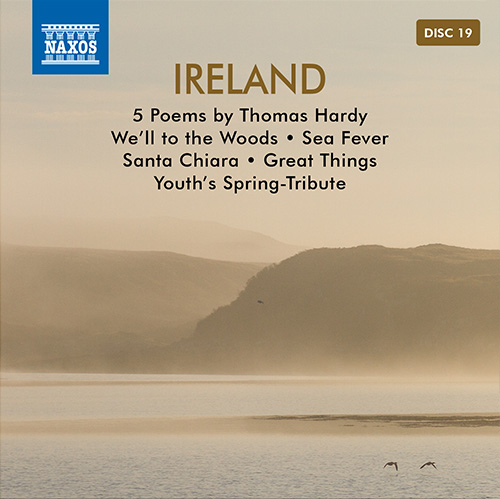
John IRELAND (1879–1962)
5 Poems by Thomas Hardy · We’ll to the Woods · Sea Fever · Santa Chiara · Great Things · Youth’s Spring-Tribute
DISC 19
Although John Ireland is best remembered for his orchestral works, his 91 songs convey a peculiarly English quality of emotion expressed through reserve. The many gems on this recording include the bittersweet Sea Fever (1913), with its yearning strophic melody sailing on an accompaniment that is varied with each verse, the dark, fatalistic 3 Songs to Poems by Thomas Hardy and the heart-rending Her Song, one of Ireland’s most beautiful. Ireland’s failure to find love is perhaps best expressed in the bleak cycle featuring two poems of A.E. Housman.
‘Every word is tasted, pungently flavoured, and given vigorous new life, with Iain Burnside’s piano playing sentient to every second of Williams’ singing.’ – BBC Music Magazine

‘Williams has exactly the right voice for these songs, and he sings them with great sensitivity, beautifully nuanced phrasing, and exquisitely controlled vocal technique. It’s a gorgeous voice.’ – American Record Guide
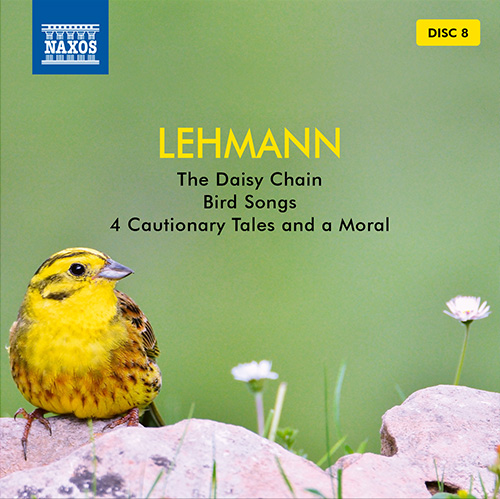
Liza LEHMANN (1862–1918)
The Daisy Chain · Bird Songs · 4 Cautionary Tales and a Moral
DISC 8
Although the British composer Liza Lehmann had begun her career as a singer, damage to her vocal cords forced her to concentrate on composition, in which she had had an interest since early childhood, and on accompaniment. This collection from her extensive song output includes poems from Stevenson’s A Child’s Garden of Verses, once familiar in every nursery, her delightful mock-serious settings of Hilaire Belloc’s Cautionary Tales and two Nonsense Songs from Lewis Carroll’s Alice in Wonderland. Although the songs are short and light-hearted, they exhibit considerably more than just period charm. Liza Lehmann’s second son, Lesley, was the father of the conductor Steuart Bedford, who accompanies the songs here, as his grandmother once did, and of the composer David Bedford.
‘This is a charming CD, beautifully recorded and performed. Steuart Berford is Liza Lehmann’s grandson. His sympathetic accompanying shows his obvious admiration for the music of his grandmother.’ – The Light Music Society
‘The singing, shared by four vocalists, is top-notch. Especially notable for their personable style and dead-on technique… All of their collaborations in the humorous songs are expertly and engagingly done.’ – ClassicsToday.com
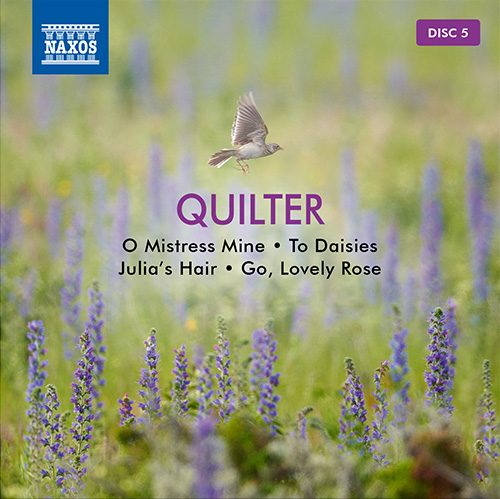
Roger QUILTER (1877–1953)
O Mistress Mine · To Daisies · Julia’s Hair · Go, Lovely Rose
DISC 5
Originally released by Collins Classics, this recording covers 40 years of Quilter’s career. It ranges from the anonymous 15th-century An Old Carol, by way of the great 16th- and 17th-century English poets, who inspired Quilter to some of his finest songs, to poems by the Irish contemporaries. With over 100 songs to his name, Quilter holds a firm place in the history of English Romantic song.
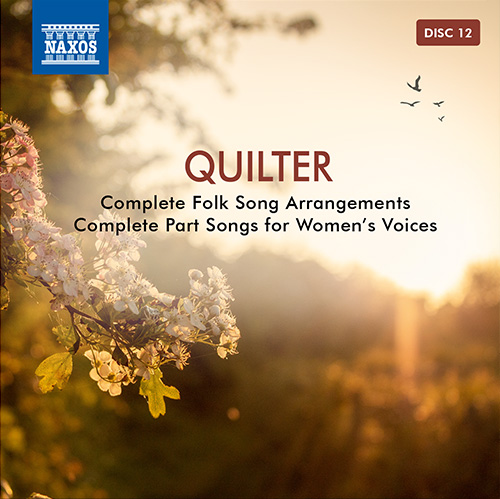
Roger QUILTER (1877–1953)
Complete Folk Song Arrangements · Complete Part Songs for Women’s Voices
DISC 12
Rooted in the sound of the Victorian drawing room ballad, Roger Quilter’s songs are elegant, refined, often private, always exquisite and without undue embellishment. Although Quilter did not draw on English folk song as a musical resource in the way that Vaughan Williams and others did, he was very well aware of the heritage and himself arranged a variety of songs, ‘one of the most delicate and dangerous undertakings’. This recording, which includes several world premieres, presents the complete folk song arrangements and complete part songs for women’s voices.
‘The songs are divided among four fine singers. Most impressive, though is David Wilson-Johnson, whose ‘Dink to Me Only with Thine Eyes’ is compelling enough to moisten the eyes. This is a lovely release.’ – American Record Guide
‘Not surprisingly, given the calibre of the artists involved, performances are consistently sympathetic, soprano Amanda Pitt and mezzo Joanne Thomas blending especially well … David Own Norris’ accompaniments are past praise in their scrupulous sensitivity.’ – Gramophone
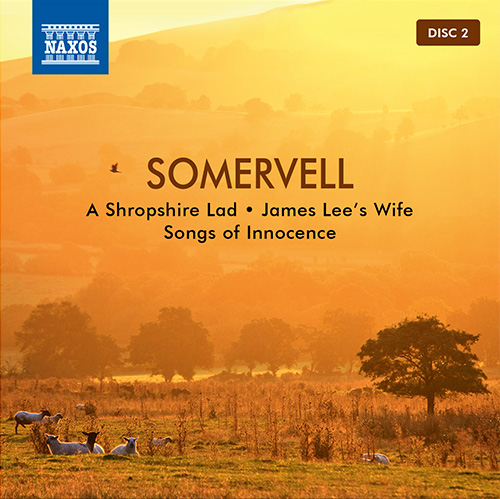
Arthur SOMERVELL (1863–1937)
A Shropshire Lad · James Lee’s Wife · Songs of Innocence
DISC 2
Originally released as part of The English Song Series on the Collins Classics label, this recording explores the vocal works of one of the pioneers of English song. Arthur Somervell was the first composer to set A.E. Housman’s A Shropshire Lad. His setting of William Blake’s Songs of Innocence shows his ease at composing for children, while his familiarity today rests on his setting of Tennyson’s Maud. The ingenuity of Somervell’s piano writing combined with his remarkably memorable vocal lines has ensured that his music retains a constant freshness.
Arthur Somervell was the first composer to set Housman’s The Shropshire Lad. His setting of William Blake’s Songs of Innocence shows his ease at composing for children, while his familiarity today rests on his setting of Tennyson’s Maud. The ingenuity of Somervell’s piano writing combined with his remarkably memorable vocal lines has ensured that his music retains a consistent freshness.
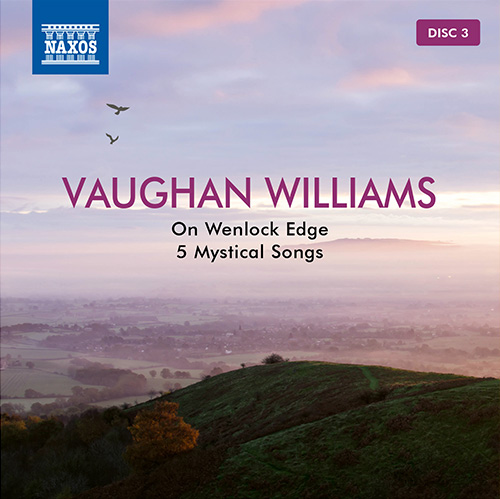
Ralph VAUGHAN WILLIAMS (1872–1958)
On Wenlock Edge · 5 Mystical Songs
DISC 3
Originally released as part of The English Song Series on the Collins Classics label, this recording includes major works by one of the key figures in English vocal music. Although best known today for his larger-scale and symphonic works, Vaughan Williams was throughout his life an enthusiast and collector of English folk music, something that led to a lifelong commitment to writing for voice and piano. The songs here range from the very beginning to the near end of the composer’s career and include the famous A.E. Housman setting On Wenlock Edge.
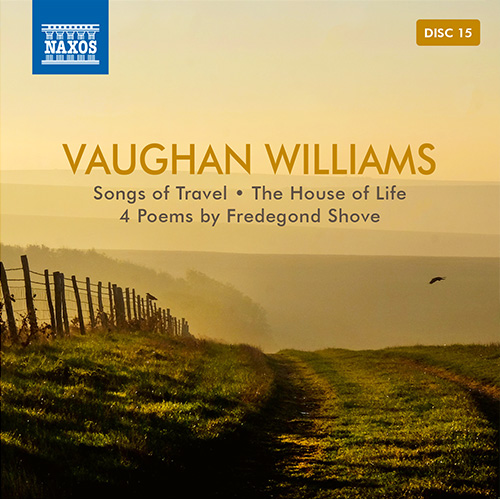
Ralph VAUGHAN WILLIAMS (1872–1958)
Songs of Travel · The House of Life · 4 Poems by Fredegond Shove
DISC 15
Although Vaughan Williams is best known as a symphonist and for large-scale choral works, the essence of his music can also be found in his songs, which demonstrate a peerless sensitivity to the beauty of the English language. Songs of Travel, composed in 1904 at a time when the composer’s personal voice was emerging, have been described as a ‘kind of English Winterreise’. Together with The House of Life, settings of six sonnets by Dante Gabriel Rossetti, they are the first to mark a significant advance from the Edwardian parlour song towards true English art song.
‘Tenor Anthony Rolfe Johnson and baritone Simon Keenlyside complement one another wonderfully. Keenlyside is at his best in songs calling for a strong delivery, while Johnson’s softer singing [is] simply delicious.’ – American Record Guide on On Wenlock Edge
‘This is a lovely compilation, featuring some of the composer’s most effective works in this form. The performances are very good… Roderick Williams is an intelligent and musical singer, with a pleasant light baritone voice.’ – Fanfare on Songs of Travel
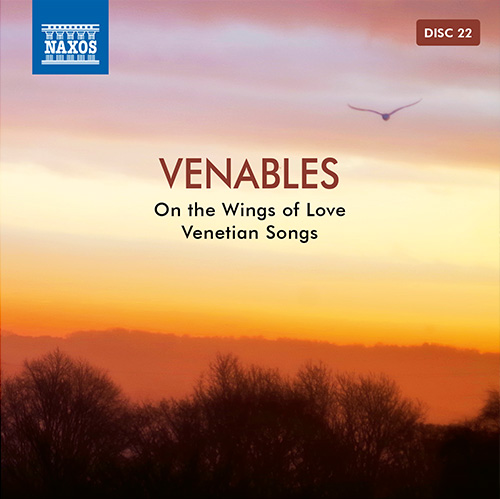
Ian VENABLES (b. 1955)
On the Wings of Love · Venetian Songs
DISC 22
Ian Venables is one of Britain’s foremost composers of art song, and has a significant catalogue of vocal and chamber music to his credit. Writing tonal music in a warm lyric vein, he has a rare gift of being able to ‘locate’ himself, believably, in a different period and absorb from it, both musically and poetically, all its fundamental beauty, while also producing works of astonishing freshness, naturalness and originality. On the Wings of Love are settings by non-English poets, while Love’s Voice sets Venetian poetry by J.A. Symonds. All his songs are sincere expressions of a love of poetry, combined with a profound understanding of musical and poetic tradition.
‘Expertly crafted, the results offer something genuinely personal and at times profound. Andrew Kennedy is the expressive, articulate tenor, Iain Burnside the outstanding accompanist.’ – BBC Music Magazine

‘With great liveliness and energy in his singing and a broad palette of vocal color, Kennedy’s performance is both invigorating and tender. English song singing doesn’t get better than this. Iain Burnside has been the anchor for this project, and his collaboration again is exemplary.’ – American Record Guide

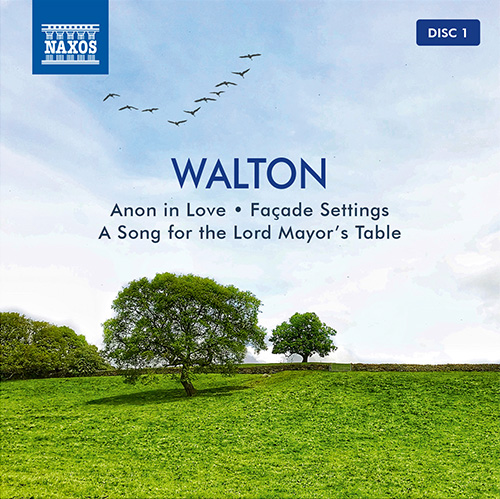
William WALTON (1902–1983)
Anon in Love · Façade Settings · A Song for the Lord Mayor’s Table
DISC 1
Originally released as part of The English Song Series on the Collins Classics label, this recording explores Walton’s most important vocal works including Anon in Love, a setting of Elizabethan love lyrics originally composed for Peter Pears and Julian Bream, and A Song for the Lord Mayor’s Table. The youthful composer’s brilliance is also underlined in small gems such as The Winds, a poem by Algernon Charles Swinburne, which the precocious Walton wrote at 16 years of age.
‘It’s magic when music can take you back to a time even the composer could only imagine. William Walton pulls off the feat with his setting of the old nursery rhyme ‘Oranges and Lemons’. It’s a simple song, but the clanging bells on the piano, one after another, bring one back ingeniously to 18th century London. That song, with its boisterous accompaniment, is only one of the joys of this record… Top-notch performers include soprano Felicity Lott, tenor Martyn Hill and the fascinating pianist Graham Johnson’ – The Buffalo News

Peter WARLOCK (1894–1930)
The Curlew · Lillygay · Peterisms, Sets I and II · Saudades
DISC 4
The programme of this release, previously available on the Collins Classics label, reflects the wide variety of vocal styles and moods of Warlock’s music. The centrepiece is Warlock’s heartfelt and atmospheric setting of W. B. Yeats’s The Curlew. Set beside this are Warlock’s boisterous drinking songs, as well as a number of more sober individual songs. This programme is an excellent introduction to one of the most interesting English composers of the first half of the 20th century.
‘This Naxos issue offers a well-chosen selection, characterfully performed to bring out the contrasting flavours, vigorous on the one hand, evocative on the other.’ – The Penguin Guide
